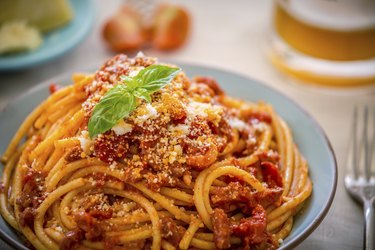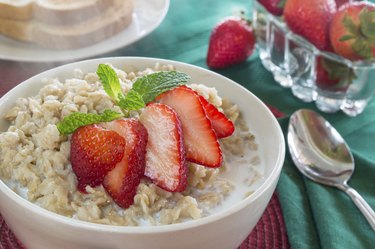
Nutrients provide your body with energy as well as building material to help your body to grow, maintain itself and heal. Carbohydrates and proteins belong to the macronutrient group, which is a class of nutrients your body needs in significantly greater quantities, than nutrients such as as vitamins or minerals. Beyond their common classification, however, carbohydrates and proteins differ slightly in their chemical composition, as well as in their general function and dietary requirements.
Component Molecules
Video of the Day

Proteins and carbohydrates contain carbon, hydrogen and oxygen molecules, although in different proportions. For instance, data from the Michigan State University Chemistry Department indicate that approximately 50 percent of all the molecules in carbohydrates are oxygen molecules, while proteins typically contain 15 to 25 percent oxygen. Also, a key feature of proteins is their relatively high nitrogen content, compared to carbs. Indeed, the nitrogen content of proteins typically ranges from 15 to 25 percent, while carbs range from zero to less than 5 percent of nitrogen.
Video of the Day
Basic Structural Units

Component molecules assemble in different ways to form the basic units of carbs and protein. In carbs, that basic unit is a saccharide, another word for sugar. Monosaccharides are single-unit sugars, the simplest carbs. These can link up with each other to form two-unit sugars -- also known as disaccharides -- or polysaccharides, which can be hundreds of units in length. In contrast, amino acids are the basic units of proteins. Approximately 20 types of amino acids act as your body's primary protein building blocks. They can assemble in very complex ways to form helices, pleated sheets, globules or even multi-unit protein structures.
Functions

While protein's primary role is structural, carbohydrates primarily serve as an energy source. In fact, glucose -- one of the simplest carbohydrates -- is your body's preferred energy currency. Whenever your body derives energy from protein because of a low supply in carbs, protein components must undergo a number of biochemical changes to be useful in energy production. Proteins serve above all as your body's building blocks. Every cell needs them for structure, but they also play important roles as molecule transporters, hormones, disease-fighting agents and enzymes Some carbs -- namely fiber -- are important for bowel health and waste elimination.
Dietary Intake

Carbohydrates and proteins also vary in their dietary requirements. The majority of your daily calories should come from carbohydrates, according to the 2010 edition of the U.S. department of Agriculture Dietary Guidelines for Americans. The USDA's recommendation for adults is a daily intake of 45 to 65 percent of total calories from carbohydrates, compared to 10 to 35 percent from protein.